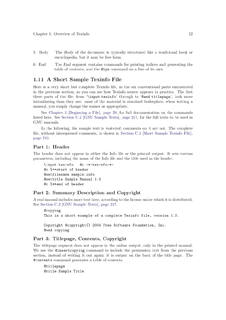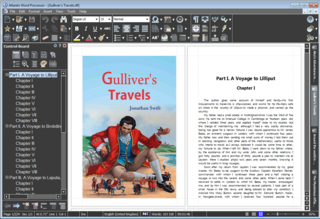Related Research Articles

LaTeX is a software system for document preparation. When writing, the writer uses plain text as opposed to the formatted text found in "What You See Is What You Get" word processors like Microsoft Word, LibreOffice Writer and Apple Pages. The writer uses markup tagging conventions to define the general structure of a document, to stylise text throughout a document, and to add citations and cross-references. A TeX distribution such as TeX Live or MikTeX is used to produce an output file suitable for printing or digital distribution.
The Rich Text Format is a proprietary document file format with published specification developed by Microsoft Corporation from 1987 until 2008 for cross-platform document interchange with Microsoft products. Prior to 2008, Microsoft published updated specifications for RTF with major revisions of Microsoft Word and Office versions.

A text editor is a type of computer program that edits plain text. Such programs are sometimes known as "notepad" software, following the naming of Microsoft Notepad. Text editors are provided with operating systems and software development packages, and can be used to change files such as configuration files, documentation files and programming language source code.
In computing, DOC or doc is a filename extension for word processing documents, most commonly in the proprietary Microsoft Word Binary File Format. Historically, the extension was used for documentation in plain text, particularly of programs or computer hardware on a wide range of operating systems. During the 1980s, WordPerfect used DOC as the extension of their proprietary format. Later, in 1983, Microsoft chose to use the DOC extension for their proprietary Microsoft Word format. These uses for the extension have largely disappeared from the PC world.

Texinfo is a typesetting syntax used for generating documentation in both on-line and printed form with a single source file. It is implemented by a computer program released as free software of the same name, created and made available by the GNU Project from the Free Software Foundation.

In computing, configuration files are files used to configure the parameters and initial settings for some computer programs. They are used for user applications, server processes and operating system settings.

Graphviz is a package of open-source tools initiated by AT&T Labs Research for drawing graphs specified in DOT language scripts having the file name extension "gv". It also provides libraries for software applications to use the tools. Graphviz is free software licensed under the Eclipse Public License.
A binary file is a computer file that is not a text file. The term "binary file" is often used as a term meaning "non-text file". Many binary file formats contain parts that can be interpreted as text; for example, some computer document files containing formatted text, such as older Microsoft Word document files, contain the text of the document but also contain formatting information in binary form.
Netpbm is an open-source package of graphics programs and a programming library. It is used mainly in the Unix world, where one can find it included in all major open-source operating system distributions, but also works on Microsoft Windows, macOS, and other operating systems.
Lout is a batch document formatter invented by Jeffrey H. Kingston. It reads a high-level description of a document similar in style to LaTeX and produces a PostScript file which can be printed on most printers. Plain text and PDF output are also available. The term Lout primarily designates a document formatting programming language, while the (only) implementation of the language is sometimes referred to as Basser Lout. Basser Lout is free software, distributed under the terms of the GNU General Public License.

Atlantis Word Processor is a stand-alone word processor for Microsoft Windows. It used to be known as "Atlantis Ocean Mind".
AsciiDoc is a human-readable document format, semantically equivalent to DocBook XML, but using plain-text mark-up conventions. AsciiDoc documents can be created using any text editor and read “as-is”, or rendered to HTML or any other format supported by a DocBook tool-chain, i.e. PDF, TeX, Unix manpages, e-books, slide presentations, etc. Common file extensions for AsciiDoc files are txt(as encouraged by AsciiDoc's creator) and adoc.
Screenwriting software are word processors specialized to the task of writing screenplays.
The following is a comparison of e-book formats used to create and publish e-books.

Antiword is a free software reader for proprietary Microsoft Word documents, and is available for most computer platforms. Antiword can convert the documents from Microsoft Word version 2, 6, 7, 97, 2000, 2002 and 2003 to plain text, PostScript, PDF, and XML/DocBook (experimental).

Apache Hive is a data warehouse software project built on top of Apache Hadoop for providing data query and analysis. Hive gives an SQL-like interface to query data stored in various databases and file systems that integrate with Hadoop. Traditional SQL queries must be implemented in the MapReduce Java API to execute SQL applications and queries over distributed data. Hive provides the necessary SQL abstraction to integrate SQL-like queries (HiveQL) into the underlying Java without the need to implement queries in the low-level Java API. Since most data warehousing applications work with SQL-based querying languages, Hive aids portability of SQL-based applications to Hadoop. While initially developed by Facebook, Apache Hive is used and developed by other companies such as Netflix and the Financial Industry Regulatory Authority (FINRA). Amazon maintains a software fork of Apache Hive included in Amazon Elastic MapReduce on Amazon Web Services.
Microsoft Office shared tools are software components that are included in all Microsoft Office products.
LibSBML is an open-source software library that provides an application programming interface (API) for the SBML format. The libSBML library can be embedded in a software application or used in a web servlet as part of the application or servlet's implementation of support for reading, writing, and manipulating SBML documents and data streams. The core of libSBML is written in ISO standard C++; the library provides API for many programming languages via interfaces generated with the help of SWIG.
Pandoc is a free and open-source document converter, widely used as a writing tool and as a basis for publishing workflows. It was created by John MacFarlane, a philosophy professor at the University of California, Berkeley.